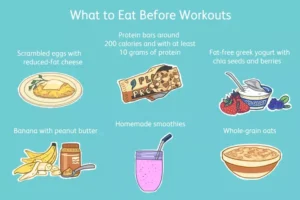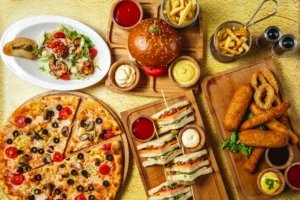Nutrition plays a pivotal role in the performance and success of a boxer. It’s not just about physical training; what you eat can significantly impact your energy levels, endurance, and recovery. In the boxing gym, choosing the right foods to consume and avoiding the wrong ones can make all the difference in your training regimen.
Foods to Consume Before Training

Before stepping into the ring or hitting the punching bag, it’s essential to fuel your body with the right nutrients:
- Complex Carbohydrates: Opt for whole grains like oats, brown rice, or whole wheat bread. These provide a steady release of energy, keeping you fueled throughout your session.
- Lean Protein Sources: Chicken, turkey, fish, or plant-based proteins like tofu or legumes are excellent choices. Protein helps repair and build muscle tissue.
- Healthy Fats: Include sources like avocados, nuts, and olive oil. These fats provide long-lasting energy and support overall health.
Foods to Consume During Training
Staying hydrated and maintaining energy levels during training is crucial:
- Hydration: Drink plenty of water before, during, and after your session. Dehydration can lead to decreased performance and fatigue.
- Quick Energy Sources: Fruits like bananas or dates are great for a quick energy boost without feeling weighed down.
Foods to Consume After Training
After a rigorous workout, your body needs nutrients to recover and repair:
- Protein for Muscle Recovery: Consume protein-rich foods like lean meats, eggs, or a protein shake. This aids in muscle repair and growth.
- Carbohydrates for Glycogen Replenishment: Replenish glycogen stores with carbohydrates like sweet potatoes, quinoa, or fruits.
Foods to Avoid Before Training
Certain foods can hinder your performance and make you feel sluggish during training:
- Heavy or Greasy Foods: Avoid heavy meals that are difficult to digest, such as fried foods or rich sauces.
- Foods High in Sugar: While they provide a quick energy spike, sugary foods can lead to a crash mid-session.
Foods to Avoid During Training

During intense workouts, it’s best to steer clear of foods that may cause discomfort:
- Carbonated Drinks: These can cause bloating and discomfort, affecting your performance.
- Heavy Meals: Large meals can lead to cramping and digestive issues.
Foods to Avoid After Training
After training, focus on nourishing your body with the right foods:
- High-Fat Meals: While fats are essential, heavy meals high in fats can slow down digestion and delay recovery.
- Processed Foods: Skip the fast food and opt for whole, nutrient-dense foods to support recovery.
Importance of Timing
Timing your meals and snacks around your training sessions is crucial for optimal performance. Eating too close to a workout can cause discomfort, while not fueling properly beforehand can lead to fatigue.
Supplements for Boxers

While a well-balanced diet should provide most of the nutrients you need, supplements can complement your nutrition plan:
- Protein Supplements: These can be convenient for post-workout recovery.
- Branched-Chain Amino Acids (BCAAs): BCAAs can aid in muscle recovery and reduce muscle soreness.
- Electrolyte Supplements: Especially useful for intense training sessions, electrolyte supplements can help maintain hydration and prevent cramping.
Meal Timing Strategies for Boxers
Meal timing can significantly impact performance and recovery for boxers. To maximize energy levels during training sessions, aim to consume a balanced meal or snack containing carbohydrates and protein 2-3 hours before exercising. Additionally, refuel your body with a post-workout meal or snack within the first hour after training to support muscle recovery and glycogen replenishment.
Conclusion
Optimizing your nutrition is a crucial aspect of achieving success in the boxing gym. By fueling your body with the right foods and avoiding nutrition pitfalls, you can maximize your performance, enhance your endurance, and expedite your recovery. Remember to prioritize hydration, balance your macronutrients, and consume wholesome, nutrient-dense foods to support your boxing journey.
FAQs
How soon before a boxing workout should I eat?
It’s recommended to eat a balanced meal containing carbohydrates and protein 2-3 hours before your boxing workout to allow for proper digestion and energy utilization.
Can I eat fruit before boxing training?
Yes, fruits are an excellent source of natural carbohydrates and can provide a quick energy boost before your boxing training session. Opt for fruits like bananas, apples, or berries for sustained energy.
What should I drink during boxing training sessions?
Water is the best choice for staying hydrated during boxing training sessions. Avoid sugary sports drinks and opt for plain water to prevent dehydration and maintain optimal performance.
Is it okay to eat fast food before boxing training?
It’s best to avoid fast food before boxing training, as it tends to be high in unhealthy fats, sodium, and processed ingredients, which can lead to sluggishness and decreased performance.
Should I eat a snack after boxing training?
Yes, consuming a snack containing carbohydrates and protein within an hour after boxing training is essential for replenishing glycogen stores, repairing muscle tissue, and promoting recovery.
Can I drink coffee before boxing training?
While moderate caffeine intake can enhance performance and alertness, excessive caffeine consumption before boxing training may lead to dehydration and jitteriness. Limit your intake and opt for plain coffee or tea without added sugars or cream.

